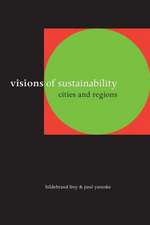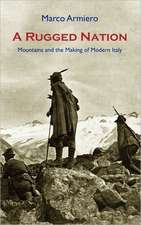Environmental History of Modern Migrations: Routledge Environmental Humanities
Editat de Marco Armiero, Richard Tuckeren Limba Engleză Hardback – 16 mai 2017
Environmental History of Modern Migrations offers a worldwide perspective on the history of migrations throughout the nineteenth and twentieth centuries and provides an opportunity to reflect on the global ecological transformations and developments which have occurred throughout the last few centuries. With a primary focus on the environment/migration nexus, this book advocates that global environmental changes are not distinct from global social transformations. Instead, it offers a progressive method of combining environmental and social history, which manages to both encompass and transcend current approaches to environmental justice issues.
This edited collection will be of great interest to students and practitioners of environmental history and migration studies, as well as those with an interest in history and sociology.
| Toate formatele și edițiile | Preț | Express |
|---|---|---|
| Paperback (1) | 415.24 lei 6-8 săpt. | |
| Taylor & Francis – 17 ian 2019 | 415.24 lei 6-8 săpt. | |
| Hardback (1) | 1002.02 lei 6-8 săpt. | |
| Taylor & Francis – 16 mai 2017 | 1002.02 lei 6-8 săpt. |
Din seria Routledge Environmental Humanities
-
 Preț: 295.41 lei
Preț: 295.41 lei -
 Preț: 289.52 lei
Preț: 289.52 lei -
 Preț: 302.46 lei
Preț: 302.46 lei -
 Preț: 303.89 lei
Preț: 303.89 lei -
 Preț: 295.00 lei
Preț: 295.00 lei -
 Preț: 288.30 lei
Preț: 288.30 lei -
 Preț: 386.32 lei
Preț: 386.32 lei -
 Preț: 340.65 lei
Preț: 340.65 lei -
 Preț: 281.14 lei
Preț: 281.14 lei -
 Preț: 310.51 lei
Preț: 310.51 lei -
 Preț: 280.72 lei
Preț: 280.72 lei -
 Preț: 369.99 lei
Preț: 369.99 lei -
 Preț: 288.72 lei
Preț: 288.72 lei -
 Preț: 303.89 lei
Preț: 303.89 lei -
 Preț: 326.78 lei
Preț: 326.78 lei -
 Preț: 311.41 lei
Preț: 311.41 lei -
 Preț: 288.38 lei
Preț: 288.38 lei -
 Preț: 191.93 lei
Preț: 191.93 lei -
 Preț: 347.74 lei
Preț: 347.74 lei - 18%
 Preț: 1050.78 lei
Preț: 1050.78 lei - 20%
 Preț: 1046.91 lei
Preț: 1046.91 lei - 28%
 Preț: 821.14 lei
Preț: 821.14 lei -
 Preț: 446.53 lei
Preț: 446.53 lei - 18%
 Preț: 1001.84 lei
Preț: 1001.84 lei -
 Preț: 441.74 lei
Preț: 441.74 lei - 26%
 Preț: 850.17 lei
Preț: 850.17 lei - 18%
 Preț: 1001.84 lei
Preț: 1001.84 lei -
 Preț: 369.95 lei
Preț: 369.95 lei -
 Preț: 415.24 lei
Preț: 415.24 lei - 18%
 Preț: 1001.07 lei
Preț: 1001.07 lei - 18%
 Preț: 1054.71 lei
Preț: 1054.71 lei - 18%
 Preț: 1000.87 lei
Preț: 1000.87 lei - 26%
 Preț: 819.09 lei
Preț: 819.09 lei - 18%
 Preț: 1171.19 lei
Preț: 1171.19 lei - 18%
 Preț: 1000.27 lei
Preț: 1000.27 lei - 16%
 Preț: 277.74 lei
Preț: 277.74 lei - 18%
 Preț: 1000.27 lei
Preț: 1000.27 lei -
 Preț: 403.91 lei
Preț: 403.91 lei - 15%
 Preț: 297.57 lei
Preț: 297.57 lei - 18%
 Preț: 1002.63 lei
Preț: 1002.63 lei - 18%
 Preț: 1053.16 lei
Preț: 1053.16 lei - 13%
 Preț: 297.99 lei
Preț: 297.99 lei - 18%
 Preț: 1004.20 lei
Preț: 1004.20 lei
Preț: 1002.02 lei
Preț vechi: 1221.97 lei
-18% Nou
Puncte Express: 1503
Preț estimativ în valută:
191.76€ • 199.46$ • 158.31£
191.76€ • 199.46$ • 158.31£
Carte tipărită la comandă
Livrare economică 15-29 aprilie
Preluare comenzi: 021 569.72.76
Specificații
ISBN-13: 9781138843172
ISBN-10: 1138843172
Pagini: 232
Ilustrații: 14
Dimensiuni: 156 x 234 x 20 mm
Greutate: 0.5 kg
Ediția:1
Editura: Taylor & Francis
Colecția Routledge
Seria Routledge Environmental Humanities
Locul publicării:Oxford, United Kingdom
ISBN-10: 1138843172
Pagini: 232
Ilustrații: 14
Dimensiuni: 156 x 234 x 20 mm
Greutate: 0.5 kg
Ediția:1
Editura: Taylor & Francis
Colecția Routledge
Seria Routledge Environmental Humanities
Locul publicării:Oxford, United Kingdom
Public țintă
Postgraduate and UndergraduateCuprins
List of figures
List of tables
List of contributors
Introduction: migrants in environmental history
Marco Armiero and Richard Tucker
Part I
Changing natures
1 Waves of migration: settlement and creation of the Hawaiian environment
Carol MacLennan
2 European immigration and changes in the landscape of southern Brazil
Eunice Sueli Nodari and Miguel Mundstock Xavier de Carvalho
3 Migrants and the making of the American landscape
Marco Armiero
4 Making the land Russian? Migration, settlement, and environment in the Russian Far East, 1860–1914
Mark Sokolsky
5 Coal lives: body, work and memory among Italian miners in Wallonia, Belgium
Daniele Valisena and Marco Armiero
Part II
Racializing natures
6 Riotous environments: Filipino immigrants in the fields of California
Linda L. Ivey
7 Creating the threatening "others": environment, Chinese immigrants and racist discourse in colonial Australia
Fei Sheng
8 Nativist politics and environmental privilege: ecological and cultural conflicts concerning Latin American migration to the United States
David Naguib Pellow and Lisa Sun-Hee Park
Part III
Naturalising causes
9 Environmental degradation as a cause of migration: cautionary tales from Brazil
Angus Wright
10 The ecological and social vulnerability of the Three Gorges resettlement area in China, 1992–2012
Ying Xing
11 Archaeologies of the future: tracing the lineage of contemporary discourses on the climate–migration nexus
Giovanni Bettini
Index
List of tables
List of contributors
Introduction: migrants in environmental history
Marco Armiero and Richard Tucker
Part I
Changing natures
1 Waves of migration: settlement and creation of the Hawaiian environment
Carol MacLennan
2 European immigration and changes in the landscape of southern Brazil
Eunice Sueli Nodari and Miguel Mundstock Xavier de Carvalho
3 Migrants and the making of the American landscape
Marco Armiero
4 Making the land Russian? Migration, settlement, and environment in the Russian Far East, 1860–1914
Mark Sokolsky
5 Coal lives: body, work and memory among Italian miners in Wallonia, Belgium
Daniele Valisena and Marco Armiero
Part II
Racializing natures
6 Riotous environments: Filipino immigrants in the fields of California
Linda L. Ivey
7 Creating the threatening "others": environment, Chinese immigrants and racist discourse in colonial Australia
Fei Sheng
8 Nativist politics and environmental privilege: ecological and cultural conflicts concerning Latin American migration to the United States
David Naguib Pellow and Lisa Sun-Hee Park
Part III
Naturalising causes
9 Environmental degradation as a cause of migration: cautionary tales from Brazil
Angus Wright
10 The ecological and social vulnerability of the Three Gorges resettlement area in China, 1992–2012
Ying Xing
11 Archaeologies of the future: tracing the lineage of contemporary discourses on the climate–migration nexus
Giovanni Bettini
Index
Recenzii
"At last, a careful look at the linkages between migration and environmental change in modern history! With an admirably international set of authors, this collection ranges far and wide, both geographically and conceptually. It should be a landmark in both global environmental history and the history of migration." — J.R. McNeill, Georgetown University, USA
"All too often, studies that claim to be ground-breaking fail to live up to the brag. This stimulating and very timely collection of essays exploring the multiple and complex connections between human migration and biophysical environments represents a refreshing exception. In a study that is politically committed to the cause of socio-environmental justice as well as intellectually innovative, the authors engage with key notions such as corporeal ecology, environmental nativism, nativist environmentalism and the environmental refugee/migrant. Editors Marco Armiero and Richard Tucker, who remind us that ‘migrants are themselves nature on the move’, are to be congratulated for launching a new research area within environmental history of urgent contemporary importance internationally."— Peter Coates, University of Bristol, UK
"This innovative and timely volume will surely change the way we think about the history of immigration. As these essays show, modern migrations are not only a social and political processes; they also have important environmental dimensions. Covering a wide geographic range—from Polynesia to Siberia, from Brazil to China, the authors lay the groundwork for a new research agenda." — Linda Nash, University of Washington, USA
"The editors have assembled an innovative group of contributors who challenge scholars of migration and environmental studies to develop a new analytical lens—one that posits mobile humans as part of nature and nature as constitutive of mobile cultures and societies. A must-read." — Donna Gabaccia, University of Toronto, Canada
"All too often, studies that claim to be ground-breaking fail to live up to the brag. This stimulating and very timely collection of essays exploring the multiple and complex connections between human migration and biophysical environments represents a refreshing exception. In a study that is politically committed to the cause of socio-environmental justice as well as intellectually innovative, the authors engage with key notions such as corporeal ecology, environmental nativism, nativist environmentalism and the environmental refugee/migrant. Editors Marco Armiero and Richard Tucker, who remind us that ‘migrants are themselves nature on the move’, are to be congratulated for launching a new research area within environmental history of urgent contemporary importance internationally."— Peter Coates, University of Bristol, UK
"This innovative and timely volume will surely change the way we think about the history of immigration. As these essays show, modern migrations are not only a social and political processes; they also have important environmental dimensions. Covering a wide geographic range—from Polynesia to Siberia, from Brazil to China, the authors lay the groundwork for a new research agenda." — Linda Nash, University of Washington, USA
"The editors have assembled an innovative group of contributors who challenge scholars of migration and environmental studies to develop a new analytical lens—one that posits mobile humans as part of nature and nature as constitutive of mobile cultures and societies. A must-read." — Donna Gabaccia, University of Toronto, Canada
Descriere
In the age of climate change, the possibility that dramatic environmental transformations might cause the dislocation of millions of people has become not only a matter for scientific speculations or science-fiction narratives, but the object of strategic plans and military analysis.
Environmental History of Modern Migrations offers a worldwide perspective on the history of migrations throughout the 19th and 20th century and provides an opportunity to reflect on the global ecological transformations and developments which have occurred throughout the last few centuries. With a primary focus on the environment/migration nexus, this book advocates that global environmental changes are not distinct from the global social transformations. Instead, it offers a progressive method of combining environmental and social history, which manages to both encompass and transcend current approaches to environmental justice issues.
This edited collection will be of great interest to students and practitioners of environmental history and migration studies as well as those with an interest in history and sociology.
Environmental History of Modern Migrations offers a worldwide perspective on the history of migrations throughout the 19th and 20th century and provides an opportunity to reflect on the global ecological transformations and developments which have occurred throughout the last few centuries. With a primary focus on the environment/migration nexus, this book advocates that global environmental changes are not distinct from the global social transformations. Instead, it offers a progressive method of combining environmental and social history, which manages to both encompass and transcend current approaches to environmental justice issues.
This edited collection will be of great interest to students and practitioners of environmental history and migration studies as well as those with an interest in history and sociology.







